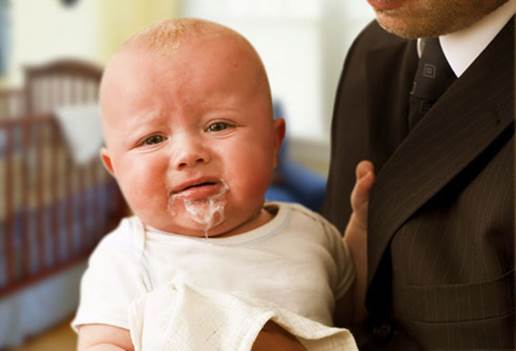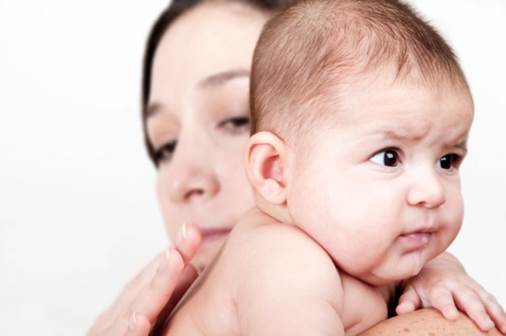Babies often spit up because of parents’ wrong
caring.
Spitting up is a common symptom in
children. The younger children are, the more they spit up. Spitting up happens
when things in the stomach (food, gastric fluid or biliary fluid…) are thrown
up through the mouth.

Spitting
up a lot can harm baby’s health.
In infants, there is 20-50% ones of them
spit up after eating and automatically stop doing so when they’re about 6-12
years old. Spitting up is also the symptom of other diseases. It causes
electrolyte and water imbalance which harm baby’s health. In that case, take
them to doctors to find the reason of it and have timely treatment.
The common reason of spitting up in babies
Babies who spit up can have diseases like
bowel obstruction, pyloric hypertrophy or stenosis, digestive tract defects or
direct infectious disease, such as ear, nose and throat infections, meningitis,
pneumonia…
Those diseases must be treated by doctors.
Besides, spitting up in babies also relates to nutrition elements. When babies
can’t absorb lactose sugars, they can spit up usually.

Usual
spitting up in babies is due to adult’s wrong caring.
However, the major reason is because the
adult’s wrong caring, which is making the babies spit up while eating foods
that they don’t like eating or capable of causing flatulence. Besides, force
them to eat can cause children the fear of food, so that they will create the
feeling of vomiting. Do not let them eat hard-digesting, have abdominal
distention, which is not right…
How to stop baby from spitting up
Some ways to help parents to reduce the
spitting up of babies:

Breastfeeding
babies moderately to prevent spitting up.
·
If children can’t absorb lactose sugars, a kind
of sugar in milk, chose ones that don’t have lactose.
·
When feeding babies, you should place the bottle
at a 45-degree angle in order not to swallow the air which causes flatulence.
·
Do not let babies suck fake nipples.
·
Create the inspiration to babies when they’re
eating, when eating with family or feeding dolls…
·
Breastfeeding babies moderately. If you feed
them over-fully, they will feel uncomfortable.
·
When putting foods on baby’s mouth, you need to
prevent feeding tools from getting deep in or touching baby’s mouth, teeth or
throat in order not to cause vomiting reflex.
·
If foods aren’t suit with baby’s taste, parents
should change them. When feeding them with new foods, parents need to let
children get used to them.
·
Some foods will cause allergies to
babies, such as eggs, seafood… You should avoid feeding foods that babies are
allergic to. There many young children that have allergies to some kinds of
food but, the allergies are gone by the time they grow older. For that reason,
parents should take notice on it to vary baby’s regimen.